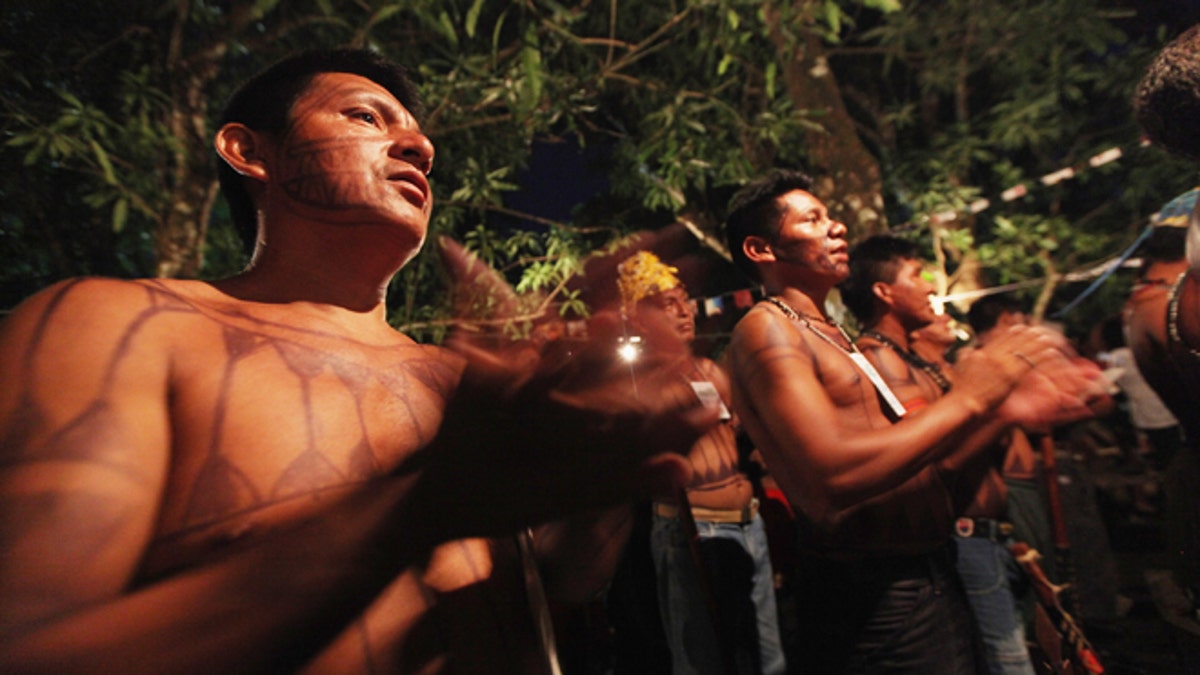
ALTAMIRA, BRAZIL - JUNE 13: Indigenous people from the Kuruaia and Xipaia tribes attend Mass at the start of the Xingu +23 event that gathers resisters of the Belo Monte dam project in the Amazon basin on June 13, 2012 in Santo Antonio, near Altamira, Brazil. Santo Antonio is adjacent to where the Belo Monte dam complex is under construction and the entire community will be expropriated for the construction. Around 60 families originally lived in Santo Antonio but now only about ten families remain. Xingu +23 is an event running parallel to the United Nations Rio + 20 event and marks 23 years since the first meeting of indigenous peoples opposed to the dam in 1989. Belo Monte will be the world?s third-largest hydroelectric project and will displace up to 20,000 people while diverting the Xingu River and flooding as much as 230 square miles of rainforest. The controversial $16 billion project is one of around 60 hydroelectric projects Brazil has planned in the Amazon to generate electricity for its rapidly expanding economy. The Brazilian Amazon, home to 60 percent of the world?s largest forest and 20 percent of the Earth?s oxygen, remains threatened by the rapid development of the country. The area is currently populated by over 20 million people and is challenged by deforestation, agriculture, mining, a governmental dam building spree, illegal land speculation including the occupation of forest reserves and indigenous land and other issues. Over 100 heads of state and tens of thousands of participants and protesters will descend on Rio de Janeiro, Brazil, later this month for the Rio+20 United Nations Conference on Sustainable Development or ?Earth Summit?. Host Brazil is caught up in its own dilemma between accelerated growth and environmental preservation. (Photo by Mario Tama/Getty Images) (2012 Getty Images)
CARACAS, Venezuela – A group of people from the Yanomami indigenous group claim a remote community in the Amazon jungle suffered a recent massacre of unknown proportions by a group of Brazilian gold miners, with people from a nearby village reporting dozens slain.
Prosecutors were appointed to investigate after leaders of the indigenous group alerted them to the account, Venezuela's Public Ministry said in a statement Wednesday.
The indigenous community of Irotatheri was attacked last month in southern Venezuela near the border with Brazil, the Horonami Yanomami Organization said in a statement to authorities, which was released Wednesday by indigenous rights activists.
Luis Shatiwe Ahiwei, a leader of the group, said visitors from a nearby village in early July found charred bodies and the community's "shabono," or circular hut, torched.
Ahiwei said in a telephone interview that it is unclear how many people were killed. But he said the witnesses sent word that about 80 people lived in Irotatheri and that they found only three survivors who had fled into the jungle.
He and others from the Yanomami organization met with military officials and prosecutors earlier this week in the southern town of Puerto Ayacucho to ask that they travel to the area.
The account of villagers from Hokomawe who saw the victims' remains and talked with the three survivors was later relayed to others in the village of Momoi after days of walking through the forest, Ahiwei said. Others then took the news to the larger community of Parima.
He said the survivors told the villagers that they had been out hunting at the time of the attack, which they blamed on miners from nearby Brazil. The hunters said they heard gunshots, explosions and the sound of a helicopter, which miners sometimes use to ferry supplies, Ahiwei said.
"Those who were hunting returned to the forest, running with fear, and they stayed in the forest," Ahiwei said.
He said that according to the survivors' account, the miners attacked because some in the community had been "rescuing Yanomami women" from miners.
The Yanomami are one of the largest isolated indigenous groups in the Amazon, with a population estimated at roughly 30,000 on both sides of the Venezuela-Brazil border. They have maintained their language as well as traditions that include face paint and wooden facial ornaments piercing their noses, cheeks and lips.
The Yanomami have often had to contend with Brazilian gold miners, known in Portuguese as garimpeiros, who for years have crossed into Venezuela and torn up the forest, leaving pits of water laced with mercury.
In 1993, activists say, 16 people were killed by Brazilian miners in a Yanomami community in the area of Haximu. In 2010, Venezuelan authorities said four people in an indigenous community died after drinking water contaminated by miners.
The Yanomami have complained of increasing encroachment by the miners.
"The presence of garimpeiros in this area has been documented since at least four years ago, and complaints have been made various times," said Aime Tillett, an activist with the indigenous rights organization Wataniba in Caracas. "What we're asking is for the government to take sufficient measures to control the garimpeiros."
The London-based indigenous rights group Survival International called for Venezuela to swiftly bring those responsible to justice and to evict wildcat gold miners. "We would like to see instant action from the Venezuelan authorities to pursue these people," said Fiona Watson, the organization's research director.
As for how many died, that remains to be seen, Watson said. "It is possible that some people did escape other than the three survivors that we know about. On the other hand, maybe it was a full-scale massacre," she said.
Linda Manaka, a representative of the Venezuelan Association of Indigenous People in Puerto Ayacucho, said that based on the account she believes dozens died.
"Generally a 'shabono' is made up of dozens of people," she said. "At least there are about four, five dozen people."
"We'd like to be able to talk with the survivors," she added.
Based on reporting by the Associated Press.
Follow us on twitter.com/foxnewslatino
Like us at facebook.com/foxnewslatino
